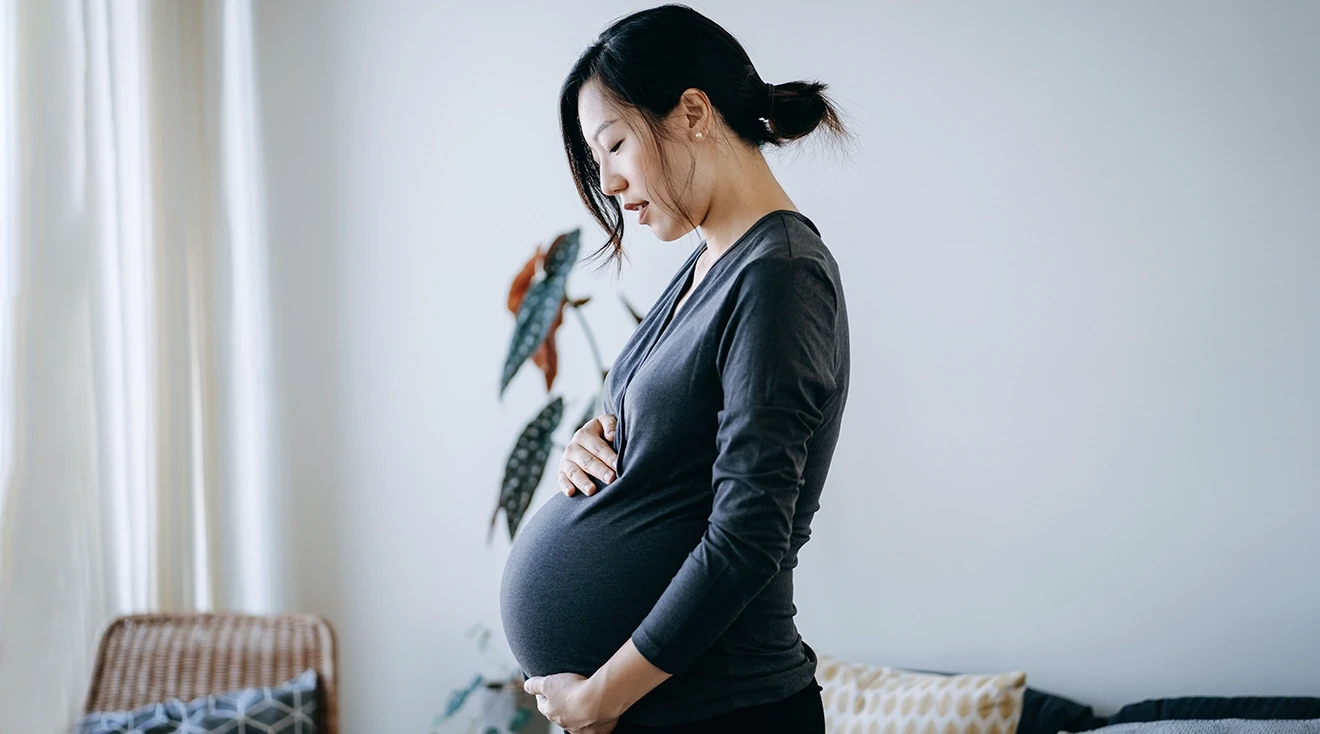Quickening in Pregnancy: When Can You Feel Baby Move and Kick?
One of the most exciting parts of pregnancy—and often the thing that makes an impending entrance into parenthood seem real—is feeling baby move. These early fetal movements felt in utero are known as quickening. And while baby kicks are what often come to mind, quickening in pregnancy actually encompasses all types of baby movement—flutters, punches, stretches and rolls.
It’s an exciting time, and you’re probably eager to experience a few internal elbow jabs and somersaults. So when can you feel baby move—and when will others be able to feel kicks from the outside? Moreover, how can you tell the difference between gas bubbles and baby moving? (It’s harder than it sounds!) Fortunately, we’re shedding light on everything you want to know about quickening in pregnancy. Read on for the lowdown.
Experiencing that first flutter is a rite of passage during pregnancy. So exactly when do you start feeling baby move? It really depends on the person, but there are some general guidelines you can expect. Most first-time pregnant people will start to feel movement between 18 and 20 weeks, says Taniqua Miller, MD, an ob-gyn and assistant professor of gynecology and obstetrics at Emory University School of Medicine in Atlanta, Georgia.
For some first-timers, it may take even longer than 20 weeks to start feeling movement, but you should definitely experience quickening by 24 weeks. “If you haven’t felt any movement by [then], you should talk with your provider,” says Maggie Bolton, CNM, a nurse-midwife and the clinical director for care model development at Quilted Health in the Seattle, Washington area.
As you experience this new sensation, you might wonder what exactly you’re feeling and why it’s happening. One analogy is that baby movements are a bit like floating, as baby is immersed in amniotic fluid. “Imagine jumping into the deep end of a pool. Not only do you feel weightless, but you’ll start moving around and fluttering about,” says Miller. In utero, babies make all sorts of motions. “Babies move every which way in the uterus, similar to the way we would when sleeping if we were floating totally weightless. They’ll kick, punch, flip-flop and wiggle all around, and they most likely enjoy the stimulation of feeling movement,” says Greg Marchand, MD, an ob-gyn and minimally invasive gynecologic surgeon at the Marchand Institute for Minimally Invasive Surgery in Mesa, Arizona.
There are some factors that shape how you experience those early baby movements. “The location of the placenta, the organ that supports the fetus, can determine the quality and intensity of the sensations you feel,” says Bolton. If you have an anterior placenta, it means the organ is attached to the front wall of the uterus, and it can “act as a sort of pillow for the bouncing fetus," says Miller. To that end, kicks may be less noticeable as the placenta absorbs the impact. "People with an anterior placenta tend to feel less movement on the front side of the belly and generally may report more side movement, especially in the earlier parts of pregnancy,” explains Miller. “As the fetus grows larger, the kicks and rolls generally become stronger and movement more noticeable.”
When can you feel baby move in a second pregnancy?
You might be wondering why some friends seem to feel their babies move sooner than you. Besides placental location, another big factor is whether or not it’s your first pregnancy. Miller explains that those who have been pregnant before may notice movements earlier—generally around 13 to 16 weeks. Basically, these moms know what to expect and can pick up on more subtle sensations. “Mothers who have had previous babies are more able to detect the movements and discern them from other movements in the abdomen, such as the gastrointestinal tract,” says Marchand.
There may also be a physical component to this. Miller explains that if you’ve had a previous pregnancy, you may have weaker abdominal walls, or diastasis recti. This can make any sort of baby movement more noticeable.
The feeling of early baby movements can be explained in many fun and unique ways. It could be described as popcorn kernels popping or like the gentle flapping of a butterfly’s wings. It’s generally subtle, but once you identify it, you’ll enjoy the sweet sensation.
“As pregnancy progresses, those small movements turn into kicks and jabs and even flips as your baby moves around in your uterus,” says Bolton. Of course, as the weeks and months go by and baby has less room to do tricks, things will feel slightly less erratic. “They won’t be doing as many gymnastic routines in your uterus,” says Bolton. Some sensations may even be felt down lower. “If there’s direct contact with the cervix, which is the neck of the uterus, some may say they feel a shooting sensation in the vagina,” says Miller.
How to tell the difference between gas bubbles and baby moving
Indigestion or baby kicks? It might seem silly, but it’s normal to wonder how to tell the difference between gas bubbles and baby moving. Suffice it to say that quickening and gas are both a regular part of pregnancy, so some initial confusion is to be expected. “Most of the time, a gas bubble will leave within a few seconds. Baby flutters are generally prolonged and consistent,” explains Bolton. Miller agrees, adding that, unlike with quickening, a trip to the bathroom often puts an end to gas.
Baby movements tend to be most noticeable during the evening hours. “During the day when a pregnant person is out and about, there’s general distraction, and the fetus is lulled to sleep by movement and generally not very active,” says Miller. But in the evening, as you settle yourself, you may start becoming more aware of baby movement. (Consider this practice for the newborn stage, when your little mover and shaker will keep you up at all hours.) Additionally, you may simply notice the movements more when you’re lying down and still, says Bolton. Biology and your internal clock also both play a role too. “The circadian rhythm of the fetus is directly influenced by the rest-activity cycle and hormonal influences of the pregnant person. So someone working overnight may not have a baby that’s as active as night, versus someone who works during the day and sleeps during the night,” says Miller.
There are a few other times you may feel baby moving and grooving more readily. "Babies in utero tend to be active after you’ve eaten and may also respond to your emotions or certain noises,” says Bolton. What’s more, if you’re in a position that isn’t comfortable for them, they’ll likely let you know by squirming around.
Now that you know when you can expect to feel baby dance and kick, you may also be super-excited to learn when your loved ones will be able to feel baby move from the outside. This will take a bit longer; it usually happens once baby’s muscles have developed enough to serve up a sufficient kick or jab. “After 24 weeks, a good kick can be felt by a hand on the abdomen,” says Marchand.
There are a few other factors that affect when others may be able to feel baby move from the outside. “People with multiple pregnancies tend to have rectus muscles that move out of the way so that the uterus is felt a little easier from the outside,” says Miller. She adds that abdominal fat may also play a role. "The thicker the abdominal wall, the more challenging it may be for someone on the outside to feel the movements.”
At 28 weeks, which Miller says “is the time the movement patterns become most reliable,” your doctor or midwife may recommend that you start doing kick counts. First and foremost, try to relax; take some time to hydrate (perhaps choose to drink something sweet, like orange juice), and sit or lie down on your side, if possible. Then, count the number of times baby moves within a two-hour period. (Note that it doesn’t have to be a kick—any kind of movement will do). You want to detect at least 10 baby movements in that time frame. Although you very well may feel sufficient movement within the first 30 minutes or so of this so-called test, the two-hour guideline accounts for a baby who might be snoozing. “If you start your clock at the start of a sleep cycle, then you may have fewer movements in that first hour. When you go on to the second hour and the fetus starts to awaken, then you generally should feel the 10 movements in that time,” says Miller.
The intensity of baby’s movements may shift throughout your pregnancy, although the frequency should not. In the first trimester, you’ll most likely feel nothing, as baby is small and protected by your uterus. During the second trimester, you’ll begin feeling those signature flutters. “Depending on how fast your baby develops, you’ll also start getting poked and prodded from the inside," says Bolton.
By the third trimester, the movements will seem less forceful. “Although the strength of kicks will decrease in the third trimester, as baby doesn’t have room to really wind up and stretch out a good kick, the frequency should never suddenly change,” says Marchand. Miller likens the later stage of pregnancy to a sleeping bag. “You still move quite a bit, but it’s more like rolls—unlike when you’re sleeping on your bed and you can really kick about,” she adds. Marchand also points out that baby’s pattern should remain consistent, but that you shouldn’t compare it to previous pregnancies. “Different babies move different amounts,” he says.
If the frequency does suddenly change, it could indicate a health concern such as low amniotic fluid—think again of that swimming pool analogy. "If baby is floating in adequate amniotic fluid, there’s still room to move around… But imagine stepping into the kiddie pool that has only one foot of water. The low fluid prevents you from really moving your entire body around. Same goes for babies with low fluid,” Miller says. This can happen toward the end of pregnancy—or if the amniotic fluid starts to leak early.
How to get baby to move
Trying to get baby to do some party tricks—or hoping to feel the reassurance of some quick punches to your side? If you’re wondering how to get baby to move, the most common recommendation is to eat or drink something sweet before doing a kick count test. “Think berries or cheese if you’re a diabetic, juice or candy if you’re not,” says Marchand.
Bolton also suggests trying to suss out baby’s specific preferences. “Figure out what your baby responds to. Is it the sound of your voice, drinking cold water, certain foods or positions? Do they love it when you do yoga or listen to rock music? Are they always active at a certain time of day?” All babies are different—even in utero.
If you have any questions about baby’s movement—or lack thereof—call your doctor or midwife. And if you’ve done a kick count test and don’t feel 10 movements during the two-hour period, seek medical care right away. "You should immediately go to the closest hospital with an obstetrical unit for a non-stress test,” says Marchand. He adds that the good news is that most of these emergencies will be false alarms from “particularly sleepy babies.”
Miller also stresses the importance of tuning in to your own intuition. Don’t wait for your regularly scheduled appointment to bring up any concerns. You know your body and baby best.
Feeling baby move for the first time is one of the thrills of pregnancy. Enjoy those early sensations; before you know it, you’ll have a little kick-boxer on your hands.
About the experts:
Maggie Bolton, CNM, is a nurse-midwife and the clinical director of care model design for Quilted Health, a midwife-led practice in the Seattle, Washington area. She received her master’s in nursing-midwifery from the University of California at San Francisco.
Greg Marchand], MD, is an ob-gyn and the founder of the Marchand Institute for Minimally Invasive Surgery in Mesa, Arizona. He earned his medical degree from Spartan Health Sciences University in St. Lucia, and completed his residency training at the University of Tennessee Health Science Center in Memphis.
Taniqua A. Miller, MD, is an ob-gyn and assistant professor of gynecology and obstetrics at Emory University School of Medicine in Atlanta, Georgia. She received her medical degree at Harvard Medical School and completed residency training at the University of Virginia Medical System. She is also the founder and CEO of Taniqua MD, an educational resource that empowers women and girls through reproductive transitions.
Please note: The Bump and the materials and information it contains are not intended to, and do not constitute, medical or other health advice or diagnosis and should not be used as such. You should always consult with a qualified physician or health professional about your specific circumstances.
Plus, more from The Bump:
Navigate forward to interact with the calendar and select a date. Press the question mark key to get the keyboard shortcuts for changing dates.




















































